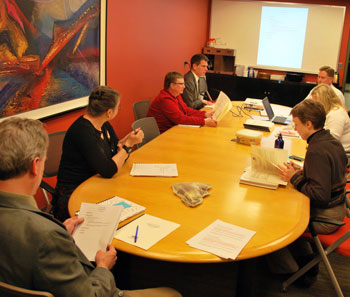Editor’s note: Before this article was finalized for publication, it was inadvertently posted for a brief time, then removed from the website. Between versions, some added material gave more precision to the planned expenditures and use of fund balance in the city of Ann Arbor’s FY 2011 budget.

The Ann Arbor city council audit committee met on Dec. 19 to review the audit for FY 2011, which ended June 30, 2011. Clockwise, starting with Stephen Kunselman (Ward 3), with his back to the camera, are Sabra Briere (Ward 1), Sandi Smith (Ward 1), city administrator Steve Powers, auditor Alan Panter, accounting services manager Karen Lancaster, and Margie Teall (Ward 4). Carsten Hohnke (Ward 5) was absent. (Photo by the writer.)
In mid-December, the audit committee of the Ann Arbor city council received what could be considered good news from the final audit for the last fiscal year. It was clean. The city also managed to add incrementally to its fund balance, instead of using more than $1 million from that balance, which it had anticipated doing.
The council’s audit committee met on Monday, Dec. 19 at 6 p.m. just before the council’s last meeting of the year, which started at 7 p.m. Last year, the committee did not meet at all, a point of complaint made by committee member Stephen Kunselman (Ward 3) at a recent council meeting.
Alan Panter of the accounting firm Abraham & Gaffney, P.C. presented the audit committee with an overview of his findings for fiscal year 2011, which were summarized in the report as “an unqualified (‘clean’) opinion on the City of Ann Arbor financial statements for the year ended June 30, 2011.”
One finding that was not deemed a “material weakness” – but was nonetheless described as a “significant” deficiency in internal controls – involved adequate documentation of employee purchase card (P-Card) use. It’s an issue familiar to the city from previous audits.
In terms of the overall financial state of the city, as reflected in the audited numbers, the city added around $127,000 to its general fund balance.
That’s significant, because the city council-approved FY 2011 budget had anticipated drawing around $1.5 million from the fund balance reserve to help cover about $81.5 million in planned general fund expenditures. So on balance, the city appears to have done at least $1.6 million better than it had planned for FY 2011. No single factor was identified during the audit committee’s discussion to account for the better performance.
At the end of FY 2011, the city’s fund balance reserves stood at around 13.6% of expenditures – which is within the range of 12-15% that Panter said was recommended.
The audit committee’s discussion included the fact that the city’s audit is required by the city charter to be completed by Sept. 30 each year – within 90 days of the end of the fiscal year. This year’s audit was not completed until Dec. 9. Based on discussion among the audit committee members and accounting services manager Karen Lancaster, missing the charter’s deadline has become routine. Lancaster indicated that the first year she’d worked for the city, in the early 1990s, that deadline had been met.
In order for the city’s overall audit to be completed, the audits from the component units have to be done first. Lancaster attributed at least part of the now-routine delay to the fact that two such units – the Ann Arbor Downtown Development Authority and the city employees’ retirement system – have their own accounting staff. That was not the case when she first began working for the city. Because the auditor first works with those separate staff to complete their individual audits, the overall process is slower than it might otherwise be, she said.
The audit committee voted to recommend acceptance of the auditor’s report.
Based on its responsibilities described in the 2006 council resolution creating the committee, next up for committee members in 2012 will be working to come up with a recommendation on the selection of an auditing firm – the contract with Abraham & Gaffney expires with this year’s audit. [Full Story]




